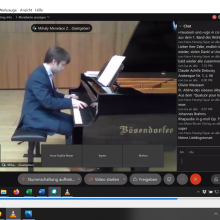How are you and your musicians managing at a time when you can’t rehearse and perform and the shared musical experience is missing?
Mihály Zeke: This period of enforced silence is particularly difficult for all of us musicians - professionals and non-professionals alike. Because, to us, music is more than just a hobby, it is also a topos of our creativity. Even when we can’t perform and make music together, we have an inexhaustible source of beauty and a permanent proof of what the human spirit is able to accomplish. It’s a privilege for sure!
What do you want to achieve with the chamber music festival idea?
We want to achieve several goals. First and foremost, of course, we want to share a live-music experience with all our university colleagues. Thanks to the internet, through which you have access to discographies everywhere, music is anything but absent during the pandemic. But, to me, a recording can never really replace the experience of a live concert. Even though artists and audiences currently communicate only via live stream, concerts remain something very special for everyone involved.
Besides, there is also a quite pragmatic reason: In a way, music is also a sport; physical and cognitive fitness must be maintained through exercise. They say, somewhat pointedly: one day without exercise means two days to get back in form. This may sound a bit exaggerated, but it’s logical that it will take us all a while until we will be able to perform again, both individually and as a group, at the level that we used to have. But, of course, making music is also a matter of the soul, and a healthy soul is a prerequisite to rebuilding techniques.
Within the framework of our festival, we will not only be performing together, but also rehearsing together. In particular, many concerts are to be preceded by a non-public online sectional .
In addition, we will seize the unique opportunity to jointly explore the beautiful chamber music repertoire and share it with our orchestra colleagues.
What will be the musical focus of the virtual Thursday concerts?
The program will be put together step by step and depends on several factors. The restriction of social contact has top priority. That’s why we want to gradually increase the instrumentation from solo to duet and trio to octet. How quickly we can get to a larger instrumentation depends, of course, on the current corona regulations. In addition, we are partly building on a repertoire that we have already rehearsed. In this way, a varied program is being created right now, which is quite spontaneously influenced by Romanticism, although composers from the Baroque and Classical periods to the modern era are also represented. On the first few Thursdays, you will be listening to works by Beethoven, Weber, Schumann, and Brahms. We want to announce the program in bi-weekly phases, which will give us time to reschedule according to the circumstances.
However, the most important aspect of the virtual Thursday concerts is not a particular piece, but the willingness of our orchestra musicians to draw and share joy and strength through the musical works they love!
PROGRAM PREVIEW
Thursday, February 4, 2021: Tomorrow the sun will shine again
Zoltán Kodály – Three chorale preludes adapted from J.S. Bach
Robert Schumann – Adagio & allegro A flat major, op. 70 for viola and piano
Johan Svendsen – Romance G major, op. 26
Richard Strauss – Morgen (“Tomorrow”) op. 27 no. 4
Thursday, February 11, 2021: New wind
Carl Maria von Weber – Andante e rondo ongarese C minor for bassoon and orchestra (piano), op. 35
Ludwig van Beethoven – Concert piece for violin C major, WoO 5
Arcangelo Corelli – Sonata G minor, op.5 no.5
Cécile Chaminade – Concertino pour Flûte D major, op.107
Carl Maria von Weber – Variations for clarinet and piano B major, op. 33



